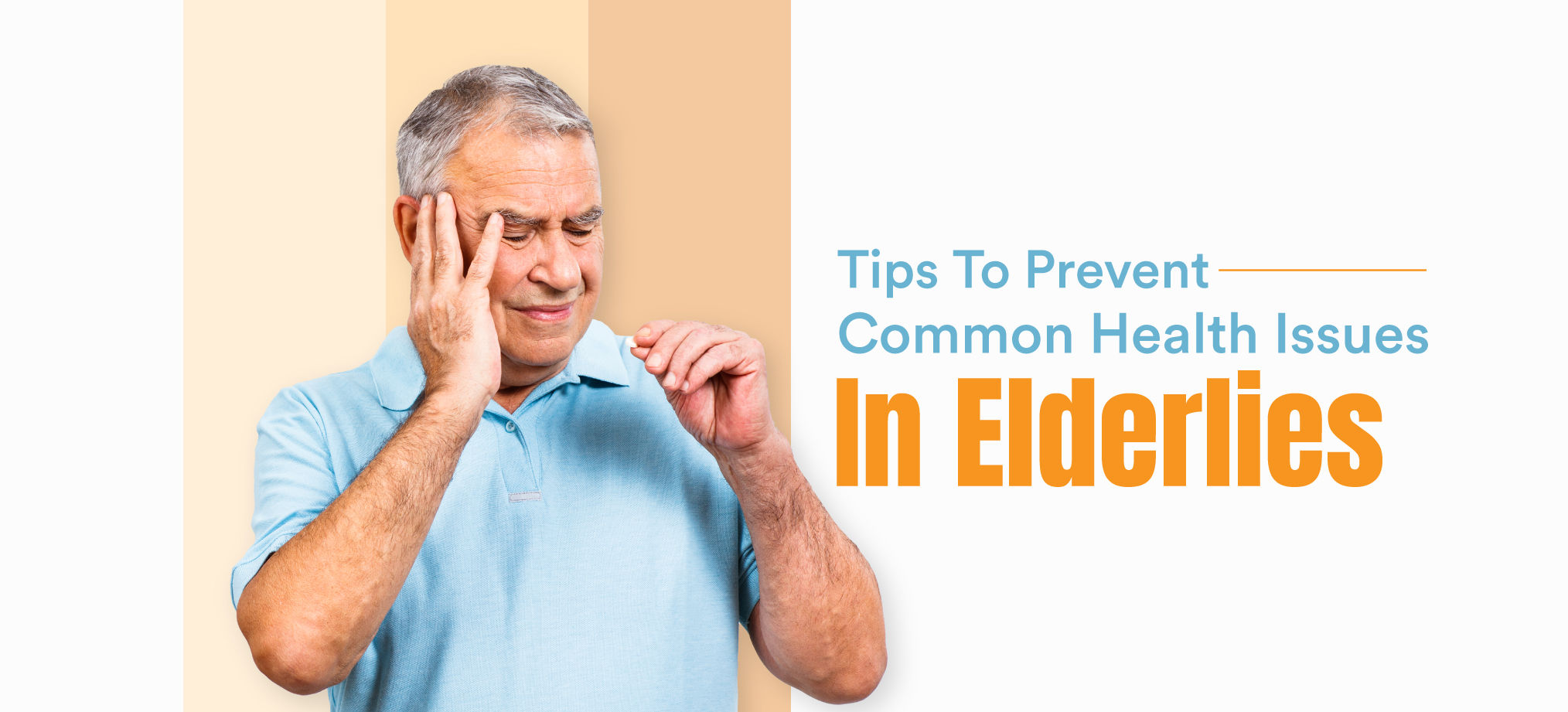General Health
Tips To Prevent Common Health Issues Like Arthritis, Diabetes & More In Elderly
5 min read
By Apollo 24|7, Published on - 06 April 2023, Updated on - 19 June 2023
Share this article
0
0 like

It's common knowledge that your internal organs lose some functions as you age. Older people often face a variety of physical and cognitive health problems that can interfere with their everyday life. As per the National Council on Aging, nearly 92% of the elderly suffer from at least one chronic disease and 77% suffer from at least two. Being aware of the common health problems faced by the elderly can help them take prevention measures and stay prepared for any medical emergencies that might come their way. So, here is a list of some of the common health issues affecting seniors and the ways to prevent them.
1. Diabetes
Diabetes is an extremely common lifestyle-related disease that occurs when the cells of your body lose the ability to utilise sugar, resulting in consistently high blood sugar levels. The risk of becoming diabetic increases as you age. In fact, those over the age of 65 are at a much higher risk of developing this disease than others. High blood sugar levels can lead to some serious long-term complications like heart disease, vision loss, and kidney problems.
To know whether you are at the risk of developing diabetes, this simple test can tell.
How to Prevent Diabetes in Elderly?
- Practise moderate-intensity exercises such as brisk walking or cycling every day.
- Reduce the intake of processed foods as they may result in insulin resistance.
- Keep an eye on your blood sugar levels with regular testing.
- Strictly adhere to the medications as prescribed by your doctor.
We suggest you consult the Best Diabetologists to know more about diabetics and its treatment methods.
2. Heart Disease
Ageing leads to changes in your heart and the surrounding blood vessels, increasing the risk of developing heart disease. Heart disease is even more concerning in old age as its symptoms may not be visible and thus are most likely to get ignored.
How to Prevent Heart Diseases in Elderly?
- Cut down on foods loaded with unhealthy fats like saturated and trans fats as they increase cholesterol levels significantly.
- Reduce or avoid the intake of alcohol.
- Quit smoking completely as it causes the blood vessels to shrink.
- Limit the daily salt intake to decrease sodium levels in the body (high levels can increase blood pressure).
You can Consult Our Expert Cardiologists to know whether you are at the risk of developing any heart disease or not.
3. Joint and Bone Related Problems
Conditions like osteoarthritis, muscle ache, and osteoporosis are very common in older people. In fact, more than half of those over the age of 65 suffer from arthritis. These problems can have a considerable adverse effect on the quality of life and affect their ability to perform everyday tasks.
Learn how does Diabetes Affect Your Bone Health and consult our best doctors to manage the conditions.
How to Prevent Joint & Bone Problems in Elderly?
- Include food items rich in vitamin D and calcium in your everyday diet.
- Indulge in regular physical activity such as walking and swimming.
- Get enough sun exposure or vitamin D supplements to maintain the necessary levels of the vitamin in the body.
- Install fall support in bathrooms to prevent accidental slips.
- Add anti-inflammatory foods like seeds, nuts, and salmon, to your diet.
- Get tested for arthritis and other bone and joint conditions if advised by your doctor.
One way to manage and treat joint & bone problems is to Consult an Orthopaedician.
4. Respiratory Diseases
Pneumonia, asthma, chronic obstructive pulmonary disease (COPD), and pulmonary fibrosis are some common respiratory diseases affecting the elderly. Moreover, COPD is one of the leading causes of death among people over the age of 65.
How to Prevent Respiratory Diseases in Elderly?
- Quit smoking right away.
- Avoid going to heavily polluted areas or wear a mask whenever you step out.
- Engage in regular breathing exercises to keep your lungs strong.
5. Alzheimer’s Disease
Alzheimer’s Disease (AD) is a degenerative neurological condition that causes brain cells to die. It is one of the most common causes of dementia, which causes a steady deterioration of cognitive, social, and behavioural abilities. The disease progresses gradually, beginning with mild memory loss and potentially growing into loss of environmental awareness and communication. AD affects the regions of the brain responsible for memory, language, and cognition, impairing an individual's ability to carry out day-to-day activities.
How to Prevent Alzheimer's Disease in Elderly?
While AD cannot be prevented completely, the risk factors can be eliminated by:
- Quitting smoking completely
- Keeping alcohol consumption to a minimum
- Avoiding substance abuse
- Consuming a healthy and well-balanced diet
Some other common health issues affecting the elderly include obesity, depression, and shingles amongst others. While there is no one way of preventing all of these issues entirely, maintaining a healthy lifestyle can help in ensuring healthy ageing. Integrating healthy habits like exercising regularly and eating a well-balanced nutrient-rich diet can go a long way in preventing many diseases and illnesses.
For more information, Consult Apollo's Expert Geriatricians
Medically reviewed by Dr Sonia Bhatt.
General Health
Leave Comment
Recommended for you

General Health
Does Acupressure Work? Here's What Experts Say
Acupressure is a complementary therapy that originates from traditional Chinese medicine. While research on acupressure is limited, initial findings suggest it can help alleviate pain and discomfort caused by various conditions. This article underlines how acupressure works and whether or not it is actually effective.

General Health
Dabur Chyawanprash: A Natural Remedy For Seasonal Allergies
Discover how Dabur Chyawanprash, a traditional Ayurvedic formulation, can strengthen your immune system and protect you from illnesses. Learn about the latest guidelines, new technologies, and lifestyle factors to enhance your overall well-being.

General Health
Typhoid Fever: Cause, Symptoms, Diagnosis, Treatment & Prevention
Learn about the common symptoms of typhoid fever, including fever, headache, abdominal pain, and diarrhoea. Stay informed and protect yourself!
Subscribe
Sign up for our free Health Library Daily Newsletter
Get doctor-approved health tips, news, and more.
Visual Stories

Could There Be More to Your Snore?
Tap to continue exploring
Recommended for you

General Health
Does Acupressure Work? Here's What Experts Say
Acupressure is a complementary therapy that originates from traditional Chinese medicine. While research on acupressure is limited, initial findings suggest it can help alleviate pain and discomfort caused by various conditions. This article underlines how acupressure works and whether or not it is actually effective.

General Health
Dabur Chyawanprash: A Natural Remedy For Seasonal Allergies
Discover how Dabur Chyawanprash, a traditional Ayurvedic formulation, can strengthen your immune system and protect you from illnesses. Learn about the latest guidelines, new technologies, and lifestyle factors to enhance your overall well-being.

General Health
Typhoid Fever: Cause, Symptoms, Diagnosis, Treatment & Prevention
Learn about the common symptoms of typhoid fever, including fever, headache, abdominal pain, and diarrhoea. Stay informed and protect yourself!
